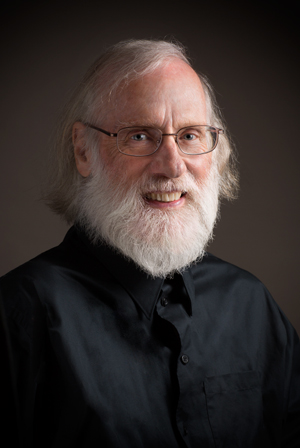
February 4, 2015
LA JOLLA–Tony Hunter, professor and director of the Salk Institute Cancer Center, in La Jolla, California, has received the BBVA Foundation Frontiers of Knowledge Award in the Biomedicine category for “carving out the path that led to the development of a new class of successful cancer drugs.”
Hunter will share the prestigious award with Joseph Schlessinger, of Yale University School of Medicine and Charles Sawyers, of Memorial Sloan Kettering Cancer Center in New York. The three recipients will split the €400,000 prize, which will be awarded at a ceremony in Madrid, Spain, in June 2015.

Tony Hunter, professor in the Molecular and Cell Biology Laboratory and director of the Salk Institute Cancer Center
Click here for a high-resolution image.
Image: Courtesy of the Salk Institute for Biological Studies
The award recognizes “the contributions of three eminent scientists who have taken the field all the way from initial basic discoveries to clinical applications that save lives,” according to the award jury.
The new treatments, all of them approved in the last ten years, differ from traditional chemotherapy in that they specifically target the mechanisms causing each type of cancer, making them less toxic for the patient. They are, as such, the first dividend of a profound understanding of the biology of cancer rather than scatter-gun molecular test activity. Imatinib, approved in 2001 and the first of this new class of pharmaceuticals, transformed chronic myeloid leukemia from a fatal cancer into one that is nearly always treatable. Now dozens of such “targeted” drugs are in use for lung and breast tumors, melanoma and lymphomas.
The jury remarked that the three laureates have participated independently in a chain of advances running from “the basic discoveries of tyrosine kinase proteins to clinical applications that save lives.”
Hunter launched the field in 1979 with his discovery of tyrosine kinases, a family of proteins instrumental in regulating vital cell processes like proliferation and metabolism. Some time later, Joseph Schlessinger identified how these tyrosine kinases were activated. And finally, Charles Sawyers found a way to interfere with their activity in the presence of mutation, “leading to the clinical translation of these basic concepts into the treatment of cancer,” the citation continues.
Since many human cancers are driven by mutations increasing tyrosine kinase activity, these proteins and the molecules they interact with have come center stage as therapeutic targets. Today, it is estimated that about a third of pharmaceutical research and development effort goes into targeting tyrosine kinase receptors and their signaling pathways for cancer therapies.
Hunter’s breakthrough, which set the story in motion, was a product of basic research on a chicken RNA tumor virus: the 1979 discovery of the first tyrosine kinase paved the way for our understanding of how cells perceive their environment and respond appropriately to growth signals. External cues act on tyrosine kinase proteins embedded in the cell membrane to induce a cascade of signals with a vital role in regulating cell proliferation. When aberrantly activated by mutation, these signals can cause cancer and are the targets for a new class of personalized cancer drug.
Hunter was born in Ashford, Kent (United Kingdom) in August 1943. He graduated in 1965 from the University of Cambridge, where he also obtained his PhD. In 1975 he joined the Salk Institute, rising to a professorship in 1982. Since 1983, he has also held a professorship at the University of California, San Diego. He has headed the Salk Institute Cancer Center since 2008.
Author of almost 550 publications, he has held editorial posts with 26 journals, including Cell, Proceedings of the National Academy of Sciences and eLife.
Among his multiple distinctions, he is a fellow of the Royal Society of London and members of the United States National Academy of Sciences and the Institute of Medicine of the National Academies.
About the Salk Institute for Biological Studies:
The Salk Institute for Biological Studies is one of the world’s preeminent basic research institutions, where internationally renowned faculty probes fundamental life science questions in a unique, collaborative, and creative environment. Focused both on discovery and on mentoring future generations of researchers, Salk scientists make groundbreaking contributions to our understanding of cancer, aging, Alzheimer’s, diabetes and infectious diseases by studying neuroscience, genetics, cell and plant biology, and related disciplines.
Faculty achievements have been recognized with numerous honors, including Nobel Prizes and memberships in the National Academy of Sciences. Founded in 1960 by polio vaccine pioneer Jonas Salk, MD, the Institute is an independent nonprofit organization and architectural landmark.
About the BBVA Foundation Frontiers of Knowledge Awards
The BBVA Foundation promotes, funds and disseminates world-class scientific research and artistic creation, in the conviction that science, culture and knowledge hold the key to building a better future for people. The Foundation implements its programs in partnership with leading scientific and cultural organizations in Spain and abroad, striving to identify and prioritize those projects with the power to move forward the frontiers of the known world.
The BBVA Foundation established its Frontiers of Knowledge Awards in 2008 to recognize the authors of outstanding contributions and radical advances in a broad range of scientific and technological areas congruent with the knowledge map of the late 20th and 21st centuries and, representing cultural creativity at its expressive height, the area of music. The Awards also reserve space for two central challenges of the present, those of climate change and development cooperation. Their eight categories include classical areas like Basic Sciences (Physics, Chemistry and Mathematics) and Biomedicine, and other, more recent areas characteristic of our time, ranging from Information and Communication Technologies, Ecology and Conservation Biology, Climate Change and Economics, Finance and Management to Development Cooperation and the innovative artistic realm of music, both classical and of our time.
Office of Communications
Tel: (858) 453-4100
press@salk.edu